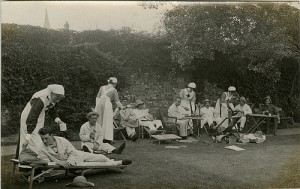 This may seem an odd post coming from someone who toots the horn of natural remedies and nourishing foods as both primary and preventative health care. However, as I’ve mentioned HERE and HERE, there are times when modern medicine saves lives and we should not lose sight of the good that can come from enlightened healers and medical technology. But how do we deal with injury recovery in a holistic way?
This may seem an odd post coming from someone who toots the horn of natural remedies and nourishing foods as both primary and preventative health care. However, as I’ve mentioned HERE and HERE, there are times when modern medicine saves lives and we should not lose sight of the good that can come from enlightened healers and medical technology. But how do we deal with injury recovery in a holistic way?
Very recently my father, who took control of his health just two years ago (read up on his story of how he used nourishing foods to conquer a diabetic condition that nearly took his life HERE), underwent surgery to remove a tumorous kidney. At 81 years old, the average patient would be told to go home, live a good life, and wait for the tumor or some other ailment to gently take them. However, my dad was in such good condition that a team of consulting physicians felt he could handle the surgery and so we pressed forward.
I knew he would be pumped full of pain killers, antibiotics and general anesthesia, pre-emptive ulcer medication, diuretics, suppositories, and many other standard hospital prescriptions that prepare and maintain patients through surgery and recovery. Rather than debate the efficacy or necessity of these treatments, I prefer to focus on natural remedies that can enhance the healing process, as well as help the patient deal with the many side effects of the prescribed drugs.
Note that these gentle remedies are not just limited to surgical recovery. Anyone suffering from a severe sprain, broken bones, flesh wounds, inflamed conditions or infections may also benefit from them.
***As I’ve mentioned HERE, I am not a physician and it is not the intention of this post to prescribe a particular course of treatment for any one person. Every individual is different and every course of treatment should be tailored towards your specific concerns. You should always discuss any supplementary treatments with your doctor to determine if they are the right choice for you. Come armed with knowledge, and demand a dialogue and a partnership with your physician (rather than a wall of fear or ignorance). Not all of these potential treatments may be appropriate for your unique situation, but if so you should be able to get a clear answer as to why they are contra-indicated. ***
So, if you do find yourself in need of some serious healing, where can you look for relief?
1. Nourishment: First off, dial down the carbs-you’ll be sedentary so you don’t need the go-go juice right now. Focus on healthy fats to fuel and repair your cells and tissue-building protein. In addition, beware of processed sugars, grains [see HERE if you have questions about why to avoid grains] and “treats”. You may feel as though when you’re in pain and unable to move much that you “deserve” a little something extra to make you feel better. However, take note that processed sugar (even from that innocent little ice cream cup the nurse tries to offer you) and grains create insulin spikes and inflammation that will cause undue stress on a body that is already under considerable strain, and will impede your healing process. The best treat you can give your body is whole, nourishing, healing food to get you back on your feet and back to living your best life. If possible, discuss with your team the option of preparing and brining in your own post-surgery recovery foods. Many foods prepared in hospital are pre-packaged, full of industrial oils, processed sugars and preservatives. The higher quality your food source, the more nutrients will be available for your healing process.
In particular, B vitamins, zinc and protein in general are crucial to build cellular strength, aid in tissue repair and scar formation, the production of antibodies and avoiding hospital-acquired infections.
Turmeric, ginger, citrus, and cayenne are anti-inflammatory, and reduce swelling, pain muscle spasms and cramping.
Celery seed possess great anti-inflammatory properties and reduces pain sensitivity, which may lessen your requirement for pain medications (concerns about that discussed below).
Cod liver oil has powerful anti-inflammatory properties which aid in healing after a severe trauma. Be sure to discuss with your doctor when to introduce this as it has blood thinning properties which may be contra-indicated for your condition or other medications.
Vitamin C and D have significant wound-healing properties.
Bone broth [chicken/beef/fish stock] is full of all the building blocks of healthy tissue, skin and bone, and is also very healing to the gut, which has undergone severe stress and bacterial changes due to the environmental and physical stress and drugs administered before, during and after a surgery or other significant trauma (see below for more on digestive issues).
Consider eliminating nightshades (tomatoes, potatoes, eggplant, peppers, paprika and cayenne) and dairy, which have severe inflammatory properties that can trigger pain and joint stiffness (especially in people prone to inflammatory and autoimmune conditions such as rheumatoid arthritis).
Certain nutritional supplements have also been shown to aid drastically in the healing process.
- Branch Chain Amino Acids (BCAAs) have been shown to aid in healing repair and liver support after surgery (be sure to discuss this with your doctor as it may affect blood sugar levels).
- L-glutamine is often depleted at times of stress, and supplementation has been shown in numerous studies to prevent catabolic muscle deterioration after surgery and increase healing time. Glutamine has a strong connection to blood sugar regulation so anyone with a history of blood sugar disregulation should monitor this closely.
2. Beware of pain killers and NSAIDs! [Non-steroidal Anti-inflammatory Drugs] You may think that popping a few ibuprofens at a time, several times a day is easier on the body than a prescription pain killer, but NSAIDs are not without their own problems. They bring with them the potential for severe stomach conditions ranging from vomiting, diarrhea and constipation to acute gastritis (a very painful inflammation of the stomach lining). Gastritis can leave you unable to hold down any food or drink, even water! If you aren’t able to keep any nourishing foods down or digest them well, not only will your healing process will be lengthened, but the medicines often prescribed to deal with the gastritis work by shutting down stomach acid, which means you will not be digesting well whatever food you do manage to keep down, and the healing process will be further retarded.
With any pain killers, be careful of the dose and duration. Processing these drugs is hard on your liver and kidneys. See below for some suggestions on how to support the organs during drug processing and detox.
Obviously sometimes pain meds are needed and can aid in a patient being able to become mobile sooner (which is crucial for recovery of health), get a solid night’s sleep(also crucial to injury recovery) and pain tolerance varies widly person to person (never judge a man until you’ve walked a mile with his surgical scars) but it’s important to know that there are natural remedies that can support your body’s healing functions and pain reduction so that your dependence on prescription medicine might be mitigated as much as possible. The less strain you put on your body (from both the surgery/injury and the recovery) the faster your body will be able to get back to stasis and get you back on your feet, pain free.
3. Were you given antibiotics for your surgery or after your injury (which are often prescribed if there is an open wound)? When you kill off the bad bacteria, you also kill off the good bacteria that resides in your gut. That bacteria is responsible for a great deal of the digestion and assimilation of your food, and serves as roughly 70% of your immune system. It’s crucial to start reintroducing the good stuff via probiotics, be it in a pill form, kombucha [see HERE on what it is, and HERE for how to brew your own] or other fermented foods such as raw sauerkraut or kvass.
4. Anti-ulcer medications are commonly given as a preemptive treatment in the hospital for stress. These medications work by suppressing stomach acid, which as I mentioned HERE is crucial for destroying pathogens. Consider natural paths of stress reduction as opposed to medications that deal only with the side effects of stress (or at least in addition to such medications). Stress is a much bigger problem during a healing process than just the potential for ulcers. Stress releases hormones that prevent cytokines, the body’s natural healing compounds, from reaching the site of the injury. This can result in a much slower healing time. Consider techniques such as meditation, mindfulness and gratitutde practice (websites like www.getsomeheadspace.com offer great 10 minute guided meditation sessions). Meditation is great for dealing with the unease of surgery as well as the everyday pressures that go along with being out of commission for a while, and is also a great mental detox for caregivers, who often forget to take care of themselves. I will be addressing meditation in greater detail in a future article. If digestive medications are necessary, you may wish to consider Swedish bitters and ox bile supplements to help enhance digestion.
5. Be good to your organs! All those drugs are tough on the liver and kidneys. Be sure to give your detox organs plenty of support by avoiding a toxic environment and toxic foods. See HERE for suggestions on how to reduce your toxic load.
6. Get moving! Taking deep breaths after surgery helps prevent pneumonia as well as helps reduce stress and keep cortisol down. This is another area where meditation comes in very handy. Lots of walking around (even if it’s just around your hospital room) gets the blood circulating which assists in healing, and also gets your bowels moving so you can eliminate and you don’t get sick and rundown from reabsorbing toxins from your waste.
We don’t live in a perfect world, and due in part to genetic expression, nutritional deficiencies, and emergency trauma (aka the “sh*t happens” factor), sometimes modern medicine is the best (or only) answer. It should never be forgotten, however, that a nourished body is a crucial piece of the puzzle for the proper treatment and recovery of such an event. Stack your deck with as many good cards as you can to ensure your very best, quickest, and pain free recovery.
To your good health!
Have you suffered a major injury? What natural remedies did you rely on to ease pain and speed the healing process?
Photo credit: Hampshire and Solent Museums / Foter / Creative Commons Attribution-ShareAlike 2.0 Generic (CC BY-SA 2.0)
 Nourished and Grounded Nutritional and Lifestyle Consulting, Functional Diagnostic Nutrition Practitioner, and MTHFR Expert
Nourished and Grounded Nutritional and Lifestyle Consulting, Functional Diagnostic Nutrition Practitioner, and MTHFR Expert




Good article, but I’m confused about cayenne.. it says its anti inflammatory in one paragraph, but then says the opposite 5 paragraphs down.
Chris, thanks for pointing out the dichotomy. Cayenne does has powerful anti-inflammatory properties, but for people sensitive to nightshades, such as those with a history of autoimmune conditions, it may be wise to avoid it (which is why it earned a spot in both categories). I hope that clears up the confusion!